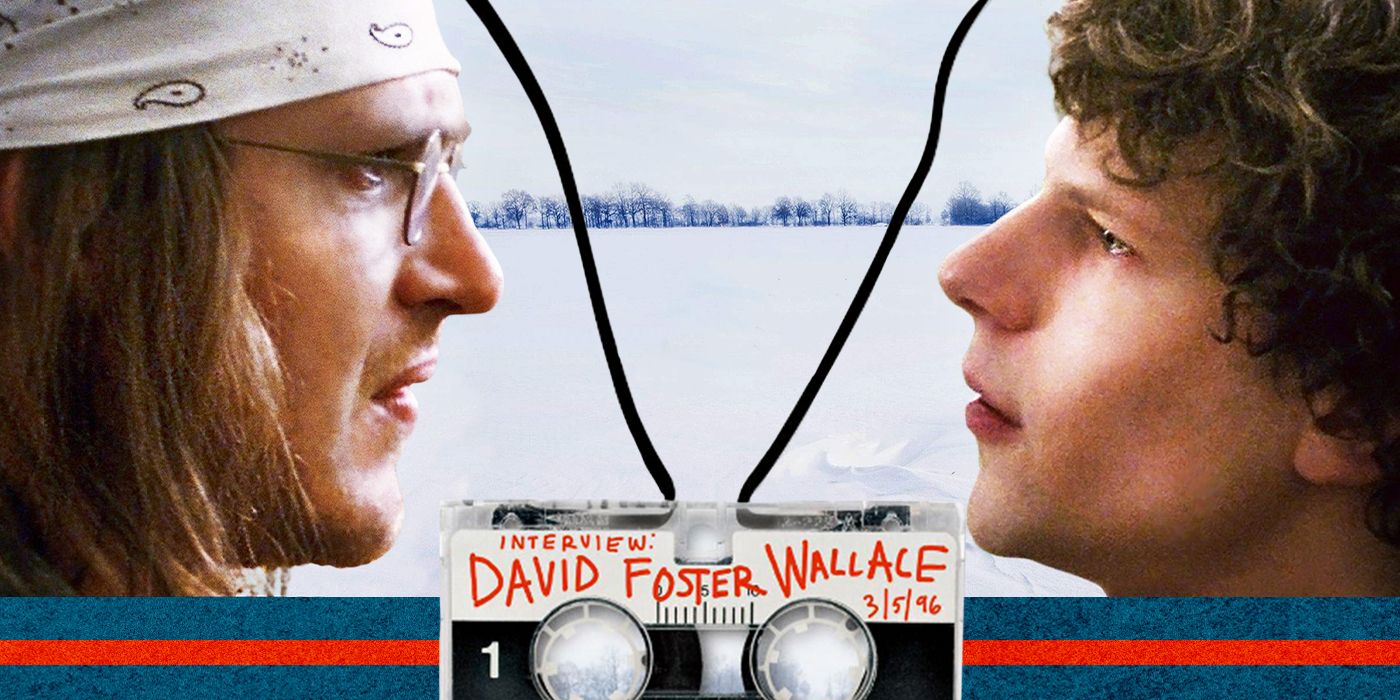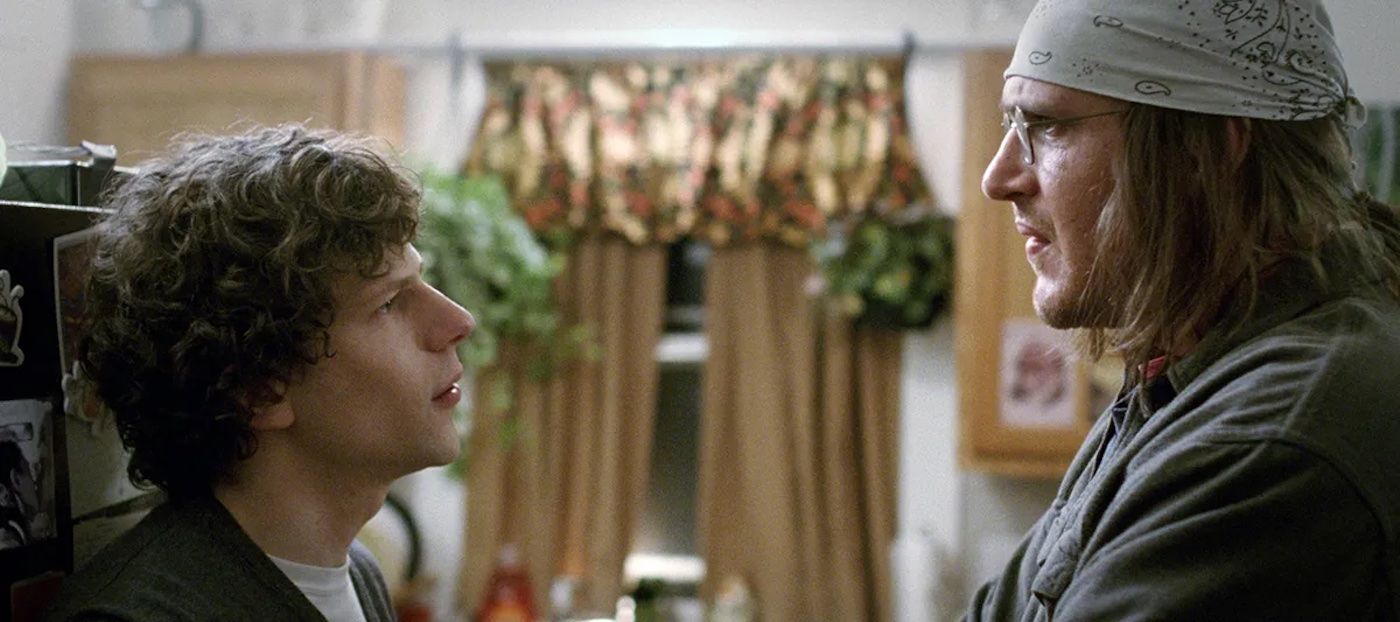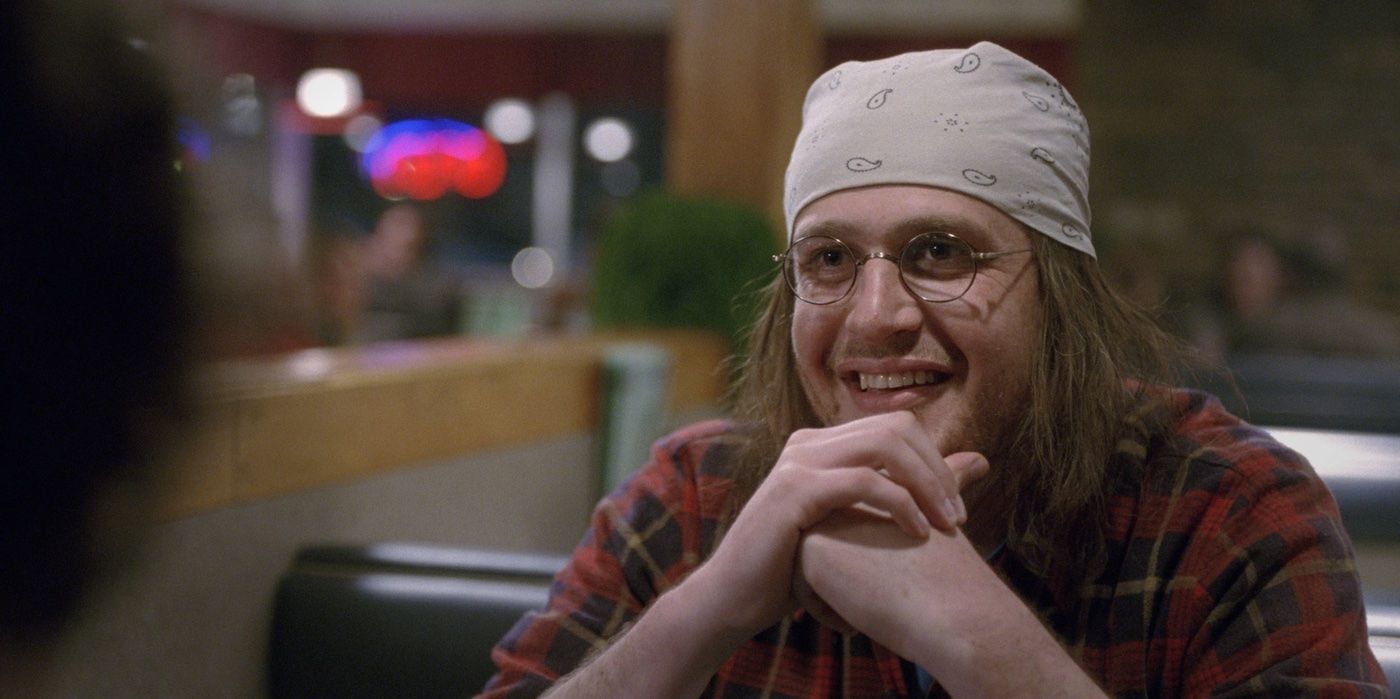It is easy for a film to slip through the cracks in terms of appreciation when it is next to A24’s back catalog of productions, and one of the finest examples of this is James Ponsoldt’s 2015 film, The End of the Tour. While released to critical acclaim, with the two lead performances from Jesse Eisenberg and Jason Segel garnering particular attention, the film remains lesser mentioned among the cultish A24 devotees and film-watchers alike, a phenomenon that can perhaps be, unfairly, attributed to its subject.
Based on David Lipsky's book Although of Course You End Up Becoming Yourself, the film recounts what is essentially a five-day-long interview-come-bonding session that took place when Lipsky (then a Rolling Stone journalist) attempted to write a profile on David Foster Wallace shortly after the release of his massively acclaimed novel Infinite Jest. Despite this encounter actually resulting in something that is organically akin to a version of Before Sunrise without the romance - with its extended philosophical discussions and musings on life - the film may seem off-putting for those unfamiliar with Wallace's writing. However, while it may sound like a film that caters to a particular strand of those "in the know," it is rather a life-encompassing affair with broad appeal, proving again that the best marker for good non-fiction is whether it can appeal to both those with prior awareness of its subject and those without.
With Infinite Jest and its fans having become something of a parody of "hip" literary culture, the film makes sure to abstain from any such cliquish sentiment, shunning literary namedropping and the like for discussions on the most universal themes such as success, ambition, depression, and loneliness. Testament to this is how, going in, the film seems to assume complete ignorance regarding its primary subjects. The opening scene immediately sets up the context of Lipsky's book, as we see Lipsky (Eisenberg) reacting to the news of David Foster Wallace's death, after which the film almost surreptitiously enters into flashback. Again, though, the viewer is guided along all the way, being placed into the same world as the younger Lipsky as he first discovers Infinite Jest after hearing about the hype from literary reviews and peers. This is, immediately, a perfect example of the way in which the film subtly provides the backdrop for what ensues without it ever leaving viewers behind or feeling like it is begrudgingly spoonfeeding them the backstory.
What follows from here as Lipsky convinces his editor to let him interview Wallace on the last legs of his book tour is not just one of film's finest examples of the interview process, but a highly thought-provoking discussion on the nature of life. Far from making unexplained connections to his work, the film instead often acts as something of a primer for Wallace's writing, cleverly interweaving and relaying issues from his essays, fiction writing, and personal life - of TV addiction, alcohol abuse, and rural isolation - within its dialogue. In one scene, for example, after struggling to explain his inner struggles with alcohol abuse and suicidal thoughts, Wallace even briefly recaps a section from Infinite Jest, making these connections transparent. He asks Lipsky if he remembers the moment in the book when a character describes depression and suicide in relation to jumping from a burning building, repeating her notion that it isn't that the jump suddenly doesn't appear frightening, but rather that the alternative of staying in the building seems impossible. Although very poignant, it may not be that this example is the film's discussion at its most universal, or at least one might hope not. However, it is the best example of why the film shouldn't appear fan-specific, in that it makes use of the novel's material in a way that doesn't ostracise those who haven't read it.
More broad though is the clever way in which the film uses the duality of its two characters. As another of the prevalent ways in which the film captures the variety of the viewership it deserves, Lipsky's and Wallace's characters seem to speak to those on both ends of the spectrum in terms of ambition, aspirations, and careers. One of Wallace's prior concerns in the film is his newfound fame and success, the fear he feels at potentially enjoying it, and his wariness of how it might negatively affect him. Lipsky, conversely, is constantly envious of the acclaim that he is notably not receiving for his own debut novel, about which no one seems to care. This duality of the characters despising both the unachieved status of their goals and the lack of fulfillment at their success ensures that the film remains infinitely relatable, not just pretentiously lauding its hero, but instead appealing to the ever-changing pride and disappointment that everyone has, at some point, felt in their own lives.
This duality of characters capturing the film's broad appeal is perhaps best seen in one of the final scenes of the film. As Lipsky is departing, he decides that he has built up the courage to give Wallace a copy of his book for him to read. Wallace's tender gratitude - played brilliantly by Segel - quickly subsides to mild frustration as Lipsky mentions how he chose his own cover art, a privilege that Wallace fails to mention he didn't have for Infinite Jest. Even without knowing this fact, in this moment lies a perfect summary of the amusing dynamic the film has built up, whereby the two are paradoxically jealous of each other, as well as being a nice parting in-joke for those aware of Wallace's enduring hatred of the cover art that his publishers chose for his book.
The moment is a perfect endpoint and an enduring example of the fun and dramatic structure present in a film that could so easily have been (and may appear to be to those who haven't seen it) a self-indulgent piece about two men talking pretentiously at each other. Instead, more than anything, this film is a terrific example of a road movie at its most enjoyable, ultimately producing a dialogue-heavy but fast-paced story about a blossoming friendship, and the heartbreaking way it concluded. If too, the topics still seem somewhat highbrow, it is worth noting that there are also countless easy-going discussions on how Wallace loves his dogs too much, or how he unabashedly enjoys fast food, trashy TV, and action films. Whether it is these everyday appreciations of such modest topics that Wallace so effectively articulates, or rather the deeper, soul-wrenching discussions on self-consciousness and loneliness that you choose to engage with most, The End of the Tour remains a deeply relatable character study that can be enjoyed by anyone, fan of its fairly niche literary subject or not.
A neat summary can be made through how, largely, it can be said that the film's universality speaks to Wallace's own desire to remain an everyman in the face of his talent, something which Lipsky rebuffs in the film by stating that people crack open a 1000-page book because the author is brilliant, not relatable. It seems fitting, then, that this film succeeds in proving that the two seemingly conflicting traits can be shown to coincide so nicely by presenting such a universally appealing, yet thoughtful, road movie.



